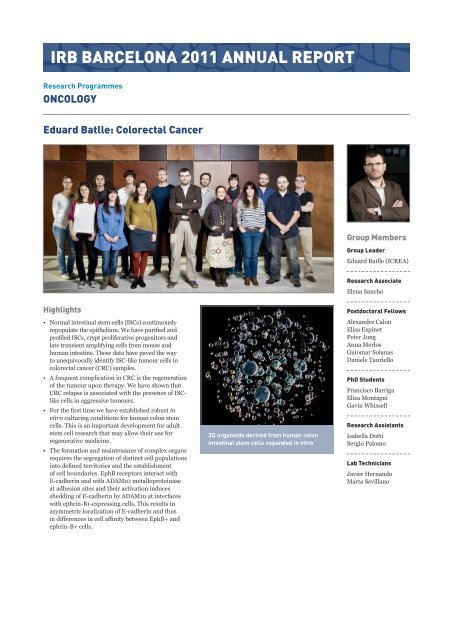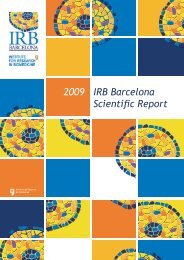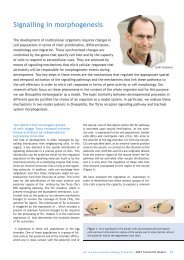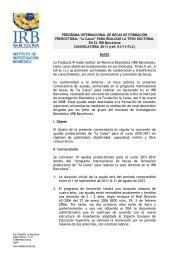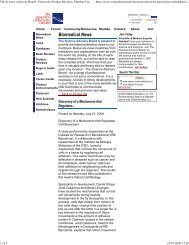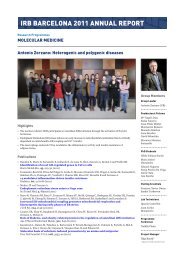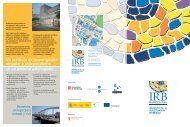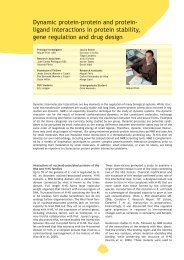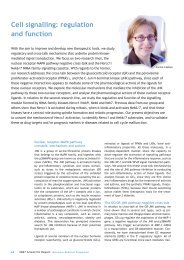Download PDF Printable Version - IRB Barcelona
Download PDF Printable Version - IRB Barcelona
Download PDF Printable Version - IRB Barcelona
You also want an ePaper? Increase the reach of your titles
YUMPU automatically turns print PDFs into web optimized ePapers that Google loves.
<strong>IRB</strong> BARCELONA 2011 ANNUAL REPORT<br />
Research Programmes<br />
Oncology<br />
Eduard Batlle: Colorectal Cancer<br />
Group Members<br />
Group Leader<br />
Eduard Batlle (ICREA)<br />
Research Associate<br />
Elena Sancho<br />
Highlights<br />
• Normal intestinal stem cells (ISCs) continuously<br />
repopulate the epithelium. We have purified and<br />
profiled ISCs, crypt proliferative progenitors and<br />
late transient amplifying cells from mouse and<br />
human intestine. These data have paved the way<br />
to unequivocally identify ISC-like tumour cells in<br />
colorectal cancer (CRC) samples.<br />
• A frequent complication in CRC is the regeneration<br />
of the tumour upon therapy. We have shown that<br />
CRC relapse is associated with the presence of ISClike<br />
cells in aggressive tumours.<br />
• For the first time we have established robust in<br />
vitro culturing conditions for human colon stem<br />
cells. This is an important development for adult<br />
stem cell research that may allow their use for<br />
regenerative medicine.<br />
• The formation and maintenance of complex organs<br />
requires the segregation of distinct cell populations<br />
into defined territories and the establishment<br />
of cell boundaries. EphB receptors interact with<br />
E-cadherin and with ADAM10 metalloproteinase<br />
at adhesion sites and their activation induces<br />
shedding of E-cadherin by ADAM10 at interfaces<br />
with ephrin-B1-expressing cells. This results in<br />
asymmetric localization of E-cadherin and thus<br />
in differences in cell affinity between EphB+ and<br />
ephrin-B+ cells.<br />
3D organoids derived from human colon<br />
intestinal stem cells expanded in vitro<br />
Postdoctoral Fellows<br />
Alexandre Calon<br />
Elisa Espinet<br />
Peter Jung<br />
Anna Merlos<br />
Guiomar Solanas<br />
Daniele Tauriello<br />
PhD Students<br />
Francisco Barriga<br />
Elisa Montagni<br />
Gavin Whissell<br />
Research Assistants<br />
Isabella Dotti<br />
Sergio Palomo<br />
Lab Technicians<br />
Javier Hernando<br />
Marta Sevillano
Publications<br />
• Campbell K, Whissell G, Franch-Marro X, Batlle E and Casanova J<br />
Specific GATA factors act as conserved inducers of an endodermal-EMT<br />
Dev Cell, 21, 1051-61 (2011)<br />
• Janich P, Pascual G, Merlos-Suárez A, Batlle E, Ripperger J, Albrecht U, Cheng HY, Obrietan K, Di Croce<br />
L and Benitah SA.<br />
The circadian molecular clock creates epidermal stem cell heterogeneity<br />
Nature, 480, 209-14 (2011)<br />
• Jung P, Sato T, Merlos-Suárez A, Barriga FM, Iglesias M, Rossell D, Auer H, Gallardo M, Blasco MA,<br />
Sancho E, Clevers H and Batlle E.<br />
Isolation and in vitro expansion of human colonic stem cells<br />
Nat Med, 17, 1225-7 (2011)<br />
• Solanas G, Cortina C, Sevillano M and Batlle E.<br />
Cleavage of E-cadherin by ADAM10 mediates epithelial cell sorting downstream of EphB<br />
signalling<br />
Nat Cell Biol, 13, 1100-7 (2011)<br />
• Merlos-Suárez A, Barriga FM, Jung P, Iglesias M, Céspedes MV, Rossell D, Sevillano M, Hernando-<br />
Momblona X, da Silva-Diz V, Muñoz P, Clevers H, Sancho E, Mangues R and Batlle E.<br />
The intestinal stem cell signature identifies colorectal cancer stem cells and predicts<br />
disease relapse<br />
Cell Stem Cell, 8, 511-24 (2011)<br />
• Solanas G and Batlle E.<br />
Control of cell adhesion and compartmentalization in the intestinal epithelium<br />
Exp Cell Res, 317, 2695-701 (2011)<br />
PhD Theses<br />
• Molecular mechanisms involved in the initiation and progression of colorectal cancer. Elisa Espinet<br />
Hernández, University of <strong>Barcelona</strong> (2011). Thesis director: Helena Sancho, Eduard Batlle. Honors: Summa<br />
Cum Laude<br />
Other<br />
• Member of the Scientific Advisory Committee for the Association for International Cancer Research (AICR)<br />
• Member of the jury for the 2011 Banc de Sabadell Award<br />
Research projects<br />
• Biología del cáncer (ONCOBIO). Consolider Ingenio-2010 (CSD2007-00017). Spanish Ministry of Science<br />
and Innovation (MICINN). 2007-2012. Principal investigator: Eduard Batlle<br />
• Dissecting the roles of the beta-catenin and Tcf genetic programmes during colorectal cancer progression,<br />
European Commission, ERC-2007STG-208488, (2008-2012). Principal investigator: Eduard Batlle<br />
• Laboratori de cancer colorrectal i biologia del epiteli intestinal. Grups de Recerca reconeguts per la<br />
Generalitat de Catalunya 2009-2013 (2009 SGR 989). Agency for Administration of University and<br />
Research Grants (AGAUR). Principal investigator: Eduard Batlle<br />
• Señalización por Wnt, receptores Eph y cáncer de colon: un análisis funcional del inicio de la<br />
tumorigénesis intestinal. Proyectos de investigación fundamental (SAF2008-01512). Spanish Ministry of<br />
Science and Innovation (MICINN). 2009-2011. Principal investigator: Eduard Batlle<br />
• Êcole Polytechnique Fédérale de Lausanne, EPFL-DLSA, (2006-open). Principal investigator: Eduard Batlle<br />
Collaborations<br />
• A role for TGB-beta in CRC progression. Elena Sancho, <strong>IRB</strong> <strong>Barcelona</strong> (<strong>Barcelona</strong>, Spain)<br />
• Antibodies against Intestinal Stem Cell genes involved in CRC. Francesc Mitjans, Leitat (<strong>Barcelona</strong>, Spain)<br />
• Common genes in pancreas cancer and CRC and Eph signalling in pancreas development. Francisco X<br />
Real, Spanish National Cancer Research Center (CNIO)(Madrid, Spain)<br />
• Development of metastatic models of CRC. Ramon Mangues and Maria Virtudes Céspedes, Hospital de la<br />
Santa Creu i Sant Pau (<strong>Barcelona</strong>, Spain)<br />
• Drosophila gut as a model for CRC development. Andreu Casali, <strong>IRB</strong> <strong>Barcelona</strong> (<strong>Barcelona</strong>, Spain)<br />
• Intestinal stem cells in CRC. Hans Clevers, Hubrecht Laboratory (Utrecht, Netherlands)<br />
• Mediators of EMT in Drosophila and CRC. Jordi Casanova, <strong>IRB</strong> <strong>Barcelona</strong> (<strong>Barcelona</strong>, Spain)
• Role of cdk6 in intestinal development. Mariano Barbacid and Marcos Malumbres, Spanish National Cancer<br />
Research Center (CNIO) (Madrid, Spain); Esther Stoeckl, University of Zurich (Zurich, Switzerland)<br />
• Telomerase length in intestinal Stem Cells. Maria A. Blasco, Spanish National Cancer Research Center<br />
(CNIO) (Madrid, Spain)<br />
• TGF-beta signaling in Inflammatory Bowel Disease. Azucena Salas, Institut d’Investigacions Biomèdicas<br />
August Pi i Sunyer (IDIBAPS) (<strong>Barcelona</strong>, Spain)<br />
• TGF-beta target genes in CRC. Joan Massagué, Memorial Sloan-Kettering Cancer Center (New York,<br />
United States)<br />
• The circadian molecular clock and stem cell niches. Salvador Aznar-Benitah. Center for Genomic<br />
Regulation (CRG) (<strong>Barcelona</strong>, Spain)<br />
• Control of intestinal stem cell positioning, Hans Clevers, Hubretch Laboratorium (Utrecht, Netherlands)<br />
• Stem cell gene expression signatures in the prediction of CRC outcome. José Baselga, Vall d’Hebrón<br />
Hospital (<strong>Barcelona</strong>, Spain)<br />
INSTITUTE<br />
FOR RESEARCH<br />
IN BIOMEDICINE<br />
© Institute for Research in Biomedicine (<strong>IRB</strong> <strong>Barcelona</strong>)<br />
Parc Científic de <strong>Barcelona</strong>. C/ Baldiri Reixac 10. 08028 <strong>Barcelona</strong> - Spain<br />
Tel: +34 93 402 02 50 | Fax: +34 93 403 71 14<br />
info@irbbarcelona.org


